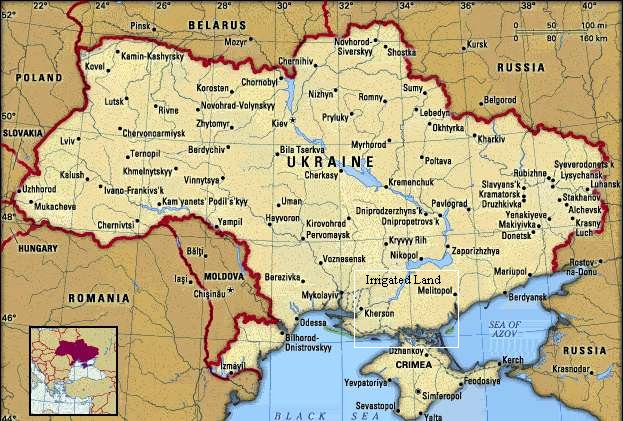 The name "Ukraine" literally translates as "on the edge." It is a country on the edge of other countries, sometimes part of one, sometimes part of another and more frequently divided. In the 17th and 18th centuries, it was divided between Russia, Poland and the Ottoman Empire. In the 19th century, it was divided between Russia and Austria-Hungary. And in the 20th century, save for a short period of independence after World War I, it became part of the Soviet Union. Ukraine has been on the edge of empires for centuries.
The name "Ukraine" literally translates as "on the edge." It is a country on the edge of other countries, sometimes part of one, sometimes part of another and more frequently divided. In the 17th and 18th centuries, it was divided between Russia, Poland and the Ottoman Empire. In the 19th century, it was divided between Russia and Austria-Hungary. And in the 20th century, save for a short period of independence after World War I, it became part of the Soviet Union. Ukraine has been on the edge of empires for centuries.


 Bill Clinton was paid an estimated $275,000 to speak at the glittering Center for Global Dialogue and Cooperation gala in Vienna — but the ex-president pulled out hours before the event after the organization's founder was convicted of international economic espionage.
Bill Clinton was paid an estimated $275,000 to speak at the glittering Center for Global Dialogue and Cooperation gala in Vienna — but the ex-president pulled out hours before the event after the organization's founder was convicted of international economic espionage.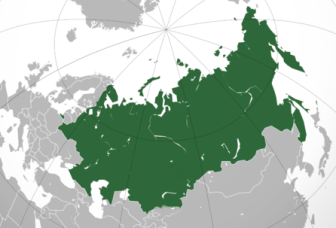 The final withdrawal of Western troops from Afghanistan and Central Asia may result in an upsurge of narcotics trafficking, terrorism and other security challenges. So are the area's leading politicians working together to head this problem off at the pass? Not according to Richard Weitz.
The final withdrawal of Western troops from Afghanistan and Central Asia may result in an upsurge of narcotics trafficking, terrorism and other security challenges. So are the area's leading politicians working together to head this problem off at the pass? Not according to Richard Weitz.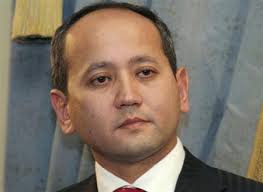 A French public prosecutor recommended on Thursday that Kazakh oligarch Mukhtar Ablyazov, accused of embezzling up to $6 billion from his former bank, be extradited to Ukraine or to Russia, which wants to put him on trial. The 50-year-old, who denies fraud charges, has been in custody at the Aix-Luynes jail in southern France since he was arrested near the Riviera resort of Cannes in July after 18 months as a fugitive.
A French public prosecutor recommended on Thursday that Kazakh oligarch Mukhtar Ablyazov, accused of embezzling up to $6 billion from his former bank, be extradited to Ukraine or to Russia, which wants to put him on trial. The 50-year-old, who denies fraud charges, has been in custody at the Aix-Luynes jail in southern France since he was arrested near the Riviera resort of Cannes in July after 18 months as a fugitive.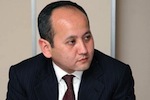 Political upheaval in Ukraine may help Mukhtar Ablyazov, the former fugitive banker at the center of a $6 billion fraud case, fight extradition to the eastern European country. A French court in Aix-en-Provence may decide at a hearing today whether to extradite Ablyazov, 50, to Ukraine, where prosecutors have charged him with perpetrating a $167 million fraud while he was chairman of Almaty, Kazakhstan-based BTA Bank from 2005 to 2009
Political upheaval in Ukraine may help Mukhtar Ablyazov, the former fugitive banker at the center of a $6 billion fraud case, fight extradition to the eastern European country. A French court in Aix-en-Provence may decide at a hearing today whether to extradite Ablyazov, 50, to Ukraine, where prosecutors have charged him with perpetrating a $167 million fraud while he was chairman of Almaty, Kazakhstan-based BTA Bank from 2005 to 2009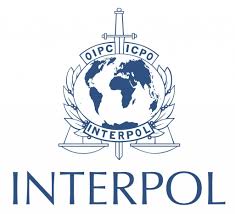 Participation in Interpol is in the U.S. national interest. However, Interpol's practice of allowing its members to transmit diffusions without systematic prior review by Interpol raises serious concerns. The U.S. should work with other democracies to reform Interpol's diffusion system and require the U.S. National Central Bureau to report annually on information provided to or received from Interpol about U.S. citizens. Because many Interpol members are not law-abiding democracies, the U.S. should further limit the nations that can access data that it provides to Interpol, protect U.S. citizens and individuals with a U.S. nexus from baseless or politicized Interpol notices and diffusions, and emphasize that continued U.S. support for Interpol depends on Interpol's scrupulous adherence to its 1956 constitution.
Participation in Interpol is in the U.S. national interest. However, Interpol's practice of allowing its members to transmit diffusions without systematic prior review by Interpol raises serious concerns. The U.S. should work with other democracies to reform Interpol's diffusion system and require the U.S. National Central Bureau to report annually on information provided to or received from Interpol about U.S. citizens. Because many Interpol members are not law-abiding democracies, the U.S. should further limit the nations that can access data that it provides to Interpol, protect U.S. citizens and individuals with a U.S. nexus from baseless or politicized Interpol notices and diffusions, and emphasize that continued U.S. support for Interpol depends on Interpol's scrupulous adherence to its 1956 constitution.
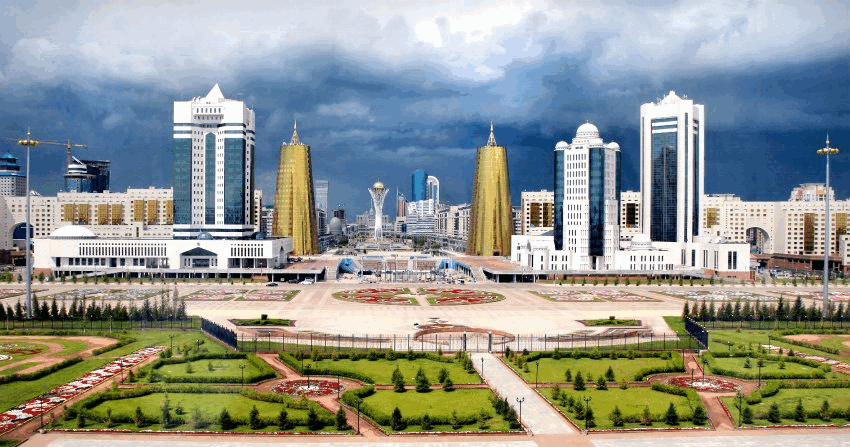 Outside of Central Asia there is very little knowledge of Kazakhstan. Once you begin to explain, some will recognize it as the large darkish red tones that illustrated most geography classrooms around the word. It is somewhere up there, between Russia and Mongolia and China. Business people, however, probably will recognize that it is one of the world's major source of hydrocarbon, uranium and grain.
Outside of Central Asia there is very little knowledge of Kazakhstan. Once you begin to explain, some will recognize it as the large darkish red tones that illustrated most geography classrooms around the word. It is somewhere up there, between Russia and Mongolia and China. Business people, however, probably will recognize that it is one of the world's major source of hydrocarbon, uranium and grain. Der kasachische Präsident Nasarbajew und sein Geheimdienstchef Alijew waren Weggefährten. Jetzt sind sie Feinde und tragen ihren Konflikt bei uns in Europa aus – es geht um Mord, Geldwäsche und die Frage, wie reiche Potentaten das Recht aushebeln können.
Der kasachische Präsident Nasarbajew und sein Geheimdienstchef Alijew waren Weggefährten. Jetzt sind sie Feinde und tragen ihren Konflikt bei uns in Europa aus – es geht um Mord, Geldwäsche und die Frage, wie reiche Potentaten das Recht aushebeln können.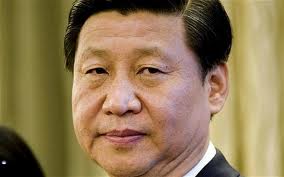 President Xi Jinping's latest, highly ambitious tour through the Central Asian republics in September took regional political circles by surprise, writes Baktybek Beshimov, a former Member of Parliament and Ambassador of Kyrgyzstan to India in his article entitled "China expands grip in Central Asia".
President Xi Jinping's latest, highly ambitious tour through the Central Asian republics in September took regional political circles by surprise, writes Baktybek Beshimov, a former Member of Parliament and Ambassador of Kyrgyzstan to India in his article entitled "China expands grip in Central Asia".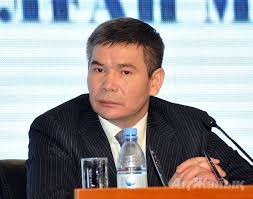 Kazakhstan's financial police said a former Atyrau regional governor, Bergei Ryskaliyev, and his associates committed crimes that caused 71 billion tenge ($459 million) in damages to the state and individuals. The results of an investigation against 22 men were transferred to the Prosecutor General's Office to start court proceedings, the agency in the capital, Astana, said by e-mail today. Ryskaliyev, his brother Amanzhan and nine other people are on an international wanted list, the agency said.
Kazakhstan's financial police said a former Atyrau regional governor, Bergei Ryskaliyev, and his associates committed crimes that caused 71 billion tenge ($459 million) in damages to the state and individuals. The results of an investigation against 22 men were transferred to the Prosecutor General's Office to start court proceedings, the agency in the capital, Astana, said by e-mail today. Ryskaliyev, his brother Amanzhan and nine other people are on an international wanted list, the agency said.

